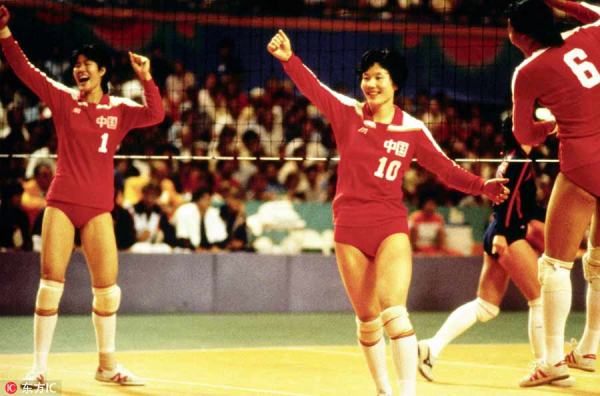Spirit of endurance matters, so does skill
By Zhu Yuan (China Daily) Updated: 2016-08-23 10:34
 |
|
Lang Ping (Left), Yang Xiaojun (Middle), Yang Xilan (Right) of China's women's volleyball team battle US in 1984 Los Angeles Olympics. [Photo/IC] |
With the Chinese women volleyball team grabbing the 26th and last Olympic gold for the country in Rio de Janeiro on Sunday, “the spirit of the Chinese women’s volleyball team” seems to have become a favorite term for many. Incidentally, there is also a raging debate on the connotation of the term and its relevance to the development of sports and a wider range of areas.
The easiest but not very unconvincing interpretation would be to link the perseverance of the volleyball players to patriotism in order to make Chinese youths more patriotic.
It is also natural for some to say this triumph is the continuation of the fighting spirit shown by the women’s volleyball team in the 1980s, when for five consecutive years it swept the major world competitions, including the Olympics. That reign not only boosted the development of China’s sports teams, but also instilled in the majority of Chinese a sense of national pride.
But that was in the early 1980s when the reform and opening up-policy had projected a rosy picture for both the country and the people. It was easy for people to accept the spirit of the women’s volleyball team as “the symbol” of dedication, which they could apply to any field of activity, from education to careers and from economic development to nation building.
Today, it would be presumptuous to say such a spirit is still needed to prompt Chinese people to be totally dedicated to their work to achieve their goal. Also, there is no need to exaggerate the fighting spirit of the volleyball players just because they beat Serbia in the final to win the gold. Many athletes, Chinese as well as foreign, also showed tons of courage, perseverance and tenacity at the Olympics and yet quite a few of them failed to win a medal. So even without the gold medal, the Chinese women volleyball players would have deserved the applause.
The women’s volleyball team spirit is actually professionalism. The players are lucky to have Lang Ping as their coach. A thorough professional, Lang has a university degree in sports management from the United States and has worked as a coach in different countries, including as coach of the US national team. That she is a former national player — during those fateful 1980s — and coach adds to her qualification.
Many say she also understands how important cohesion is for a team and has her own way of cultivating dedication in her players — dedication to the roles they play on the court. Vigorous training, she believes, is the only way to improve a player’s skills.
“The spirit of endurance is never enough, you need to be skillful enough.” This is her answer to a question about the women’s volleyball team spirit.
It is because of the professionalism and spirit of endurance Lang has instilled in her team that the players could grab victory from the jaws of defeat — their losses to Serbia and the Netherlands in the initial stages. The two setbacks tested the maturity and resilience of Lang’s team. And the wins against host Brazil in the quarters and the Netherlands in the semis showed how resilient the team really was.
Of course, with enough efforts and luck, the players also got the better of Serbia in the final and, along with the gold, won the spirit sobriquet for the team.
The gist is that a sports team cannot expect to win without professionalism and the spirit of endurance, but not all teams with professionalism and the spirit of endurance will win every time it takes the field or court.
The author is a senior writer with China Daily. zhuyuan@chinadaily.com.cn












